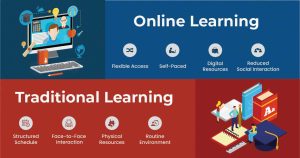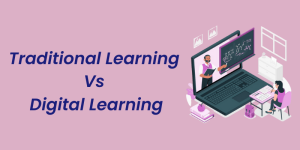🧭 Introduction
In today’s fast-changing world, education has gone beyond the boundaries of classrooms.
Now students can choose between Online Education (E-Learning) and Traditional Education (Classroom Learning).
Both have their own benefits and challenges, but the real question is — which one suits you best?
💻 What is Online Education?
Online Education means studying through the internet using digital devices like laptops or smartphones.
It allows students to learn from anywhere without attending a physical classroom.
- Main Features of Online Education
- Learn anytime and anywhere
- Access recorded lectures and materials
- Flexible schedule according to your lifestyle
- Use of modern technology and e-learning app
🏫 What is Traditional Education?

Traditional Education is the conventional way of learning in schools, colleges, and universities.
It involves face-to-face interaction between teachers and students inside the classroom.
Main Features of Traditional Education
Fixed schedule and regular classes
In-person interaction with teachers and classmates
Textbooks and printed notes used for study
Focus on discipline, attendance, and teamwork
⚖️ Key Differences Between Online and Traditional Education
Aspect Online Education Traditional Education
Learning Environment Virtual classes using the internet Physical classroom setup
Flexibility Highly flexible Fixed schedule
Cost More affordable Expensive (fees, transport, etc.)
Interaction Through video calls and chat Face-to-face discussions
Access Learn from anywhere Limited to school/university
Learning Style Self-paced Teacher-led
Technology Use High Limit
🌟 Advantages of Online Education
1. Flexibility: Study at your own time and speed.
2. Affordable: Save on travel, books, and hostel expenses.
3. Global Access: Learn from world-class universities.
4. Variety of Courses: From short skill courses to full degrees.
5. Comfortable Learning: Study from the comfort of your home
🎯 Advantages of Traditional Education
1. Face-to-Face Interaction: Direct guidance from teachers.
2. Structured Routine: Helps maintain discipline.
3. Social Experience: Group discussions and teamwork build confidence.
4. Practical Learning: Hands-on experience in labs and classrooms.
5. Instant Feedback: Teachers can correct mistakes immediately.
- 🚀 Which One Should You Choose?
- Your choice depends on your goals, learning style, and lifestyle.
- ✅ Online Education is Best If You:
- Need flexibility due to work or family.
- Are self-motivated and tech-savvy.
- Want to learn from international instructors
- ✅ Traditional Education is Best If You:
- Prefer real-life classroom experience.
- Learn better with direct teacher interaction.
- Enjoy group discussions and teamwork.
- 🔮 Conclusion
- Both Online Education and Traditional Education are powerful ways to learn.
- While online learning provides freedom and technology, traditional learning builds discipline and social skills.
- In the future, education will become a blend of both systems, giving students the best of both worlds.
- > 💬 “Education is evolving — it’s not about where you learn, but how you learn